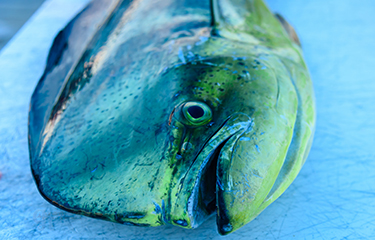Guatemalan fishing council Industria Pesquera y Camaronera de Guatemala (Indupecasa) and the Center for Development and Sustainable Fisheries (CeDePesca) have collaborated to relaunch a fishery improvement project (FIP) for the Pacific mahi and yellowfin tuna fishery operating within Guatemalan waters.
The Guatemalan mahi (Coryphaena hippurus) fishery, which has been in place for 20 years and mainly features small-scale boats, is an important source of work along the country’s Pacific coast – particularly in Escuintla, one of Guatemala’s major fishing districts.
A fast-growing predator that lives up to four years, and can reach a length of 2 meters, mahi is a highly migratory pelagic species inhabiting highly oxygenated waters in tropical and subtropical parts of the Pacific, Atlantic, and Indian oceans, according to CeDePesca. The U.S. market is a main importer of mahi products.
Though most mahi fisheries are seasonal, the fish are permanently present in Guatemalan waters due to particular oceanographic conditions. However, events such as El Niño can affect mahi’s usual distribution.
The related FIP for the fishery initially launched in 2013 but came to a halt in 2016, as did the entire fishery for a short time, according to Sara Pérez, CeDePesca’s project coordinator for the improvement of the Guatemalan mahi and tuna fishery.
“Mahi fishing on our coasts was scarce; there was a significant drop, and so there was no continuity. After those losses, it took the Guatemalan partners a while to reactivate the fishery,” Pérez told SeafoodSource. “Mahi fishing in Guatemala resumed toward the end of 2017, and now, a partner has gotten interested and contacted [CeDePesca] to start the FIP with their partner in Guatemala.”
It is no surprise that CeDePesca was the group contacted – it has direct experience relaunching FIPs and the center was involved with a similar project in Panama last year.
The Guatemalan FIP, meanwhile, relaunched in June 2023 with new partners, and incorporates yellowfin tuna together with mahi. Indupecasa is functioning as the local entity for the project, working in conjunction with U.S. importers and wholesalers including Red Chamber Co., Tampa Bay Fisheries, Aqua Star, Neptune Foods, Tequesta Bay, and Meridian Products.
The project is a prospective FIP, meaning there is an intention to meet the requirements for active FIP status within one year. According to FisheryProgress, prospective FIPs do not yet demonstrate progress toward sustainability.
During the development stage, CeDePesca will conduct a Marine Stewardship Council (MSC) pre-assessment, provide improvement recommendations, and develop a plan to address key issues. Currently, the prospective FIP profile is available on FisheryProgress.org.
The major problems the project is trying to tackle include ...
Photo courtesy of SiestaImage/Shutterstock








